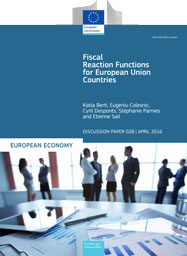Koukiadaki, Aristea, Távora, Isabel, Lucio,Miguel Martínez, (2016), “Structural Labour Market Reforms And The Collective Bargaining Landscape In Europe”, Social Europe, 26 April The sovereign debt crisis continues to have profound consequences on industrial relations systems across the European Union. Most notably, collective bargaining has become much weaker and more fragmented in many countries as a result of both domestic and supranational responses to the crisis. But how exactly are policy …Read More
Italy’s Atlas bank bailout fund: the shareholder of last resort
Merler, Silvia, “Italy’s Atlas bank bailout fund: the shareholder of last resort”, Bruegel, 22 April Italy’s new bank fund Atlas might be what is needed in the short run, but in the longer term the fund will increase systemic risk. What ultimately matters is how this initiative will affect the quality of bank governance, a key issue for the future resilience of the system. In Greek mythology, Atlas the Titan was …Read More
Reforming the international monetary system
Singh, Anoop, (2016),“Reforming the international monetary system”, Brookings, 19 April It is close to a decade since the start of the global financial crisis that raised many critical questions. Among these are how the international monetary system monitors, regulates, and manages the volatility of global liquidity and the consequent risks for international financial stability. The International Monetary Fund (IMF) is also now discussing a road map for strengthening the international monetary system …Read More
Fine-tuning the use of bail-in to promote a stronger EU financial system
Micossi, Stefano, Bruzzone, Ginevra, Cassella,Miriam, (2016), “Fine-tuning the use of bail-in to promote a stronger EU financial system”, CEPS Special Report No. 136 / Απρίλιος 2016 This paper discusses the application of the new European rules for burden-sharing and bailin in the banking sector, in view of their ability to accommodate broader policy goals of aggregate financial stability. It finds that the Treaty principles and the new discipline of state aid and …Read More
Origins of Reform Resistance and the Southern European Regime
Heinemann, Friedrich, Grigoriadis Theocharis, (2015), “Origins of Reform Resistance and the Southern European Regime”, ZEW Working Paper no 20, July2013 This analysis deals with reform obstacles in general and with the particular challenges of institutional change under the conditions of Southern Europe in particular. It presents a survey on the possible drivers of reform resistance. This includes very different qualities of approaches ranging from classical economics and politicaleconomic explanations to more innovative …Read More
Towards a fiscal union for the Eurozone
Allard, Céline, Bluedorn, John C, (2016), “Towards a fiscal union for the Eurozone”, Voxeu, 22 April European fiscal rules were too loosely implemented to ensure that public finances were managed appropriately across the cycle in member states. Weak fiscal policies in some countries before the crisis left them ill prepared when adverse shocks manifested. Windfalls from lower interest and debt payments were not saved, higher revenues generated by unsustainable domestic demand …Read More
Fiscal Reaction Functions for European Union Countries
Berti, Katia, Colesnic, Eugeniu, Desponts, Cyril, Pamies, Stephanie, Sail, Etienne, (2016), “Fiscal Reaction Functions for European Union Countries”, European Commission, Discussion Paper 28, Αpril This paper estimates country-specific fiscal reaction functions (FRFs) for selected European countries and tests for a change in fiscal behaviour since the beginning of the economic and financial crisis. The estimated country-specific FRFs, as well as a panel FRF for Central and Eastern European countries, are used in medium-term projections …Read More
Household debt and the transmission of monetary policy: New evidence
Cloyne, James, Ferreira, Clodomiro F.,Surico, Paolo, (2016), “Household debt and the transmission of monetary policy: New evidence”, Voxeu, 21 April Monetary policy has significantly heterogeneous effects on private consumption, which depend on the household’s debt and balance sheet position. This column suggests that households with mortgage debt behave in a liquidity-constrained manner, while those without are far less sensitive to movements in interest rates. Though the direct channel of monetary transmission – i.e. …Read More
Measuring the quality of jobs in OECD countries
Scarpetta, Stefano, Cazes, Sandrine, Garnero, Andrea, (2016), “Measuring the quality of jobs in OECD countries”, Voxeu, 21 Απριλίου ob quality plays a significant role in individuals’ well-being as well as promoting labour force participation, productivity, and economic performance. But it can be an elusive concept if not grounded in hard data. This column presents a new OECD framework to measure and assess the quality of jobs based on three measurable dimensions – earnings …Read More
The Case Against Helicopter Money
Heise, Michael, (2016), “The Case Against Helicopter Money”, Project Syndicate, 20 April Despite years of expansionary monetary policy, the European Central Bank has failed to push inflation back up to its target of “below but close to 2%.” The latest measures – a zero interest rate on the ECB’s main refinancing operations, an increase in monthly asset purchases from €60 billion ($67 billion) to €80 billion, and an even lower deposit …Read More





